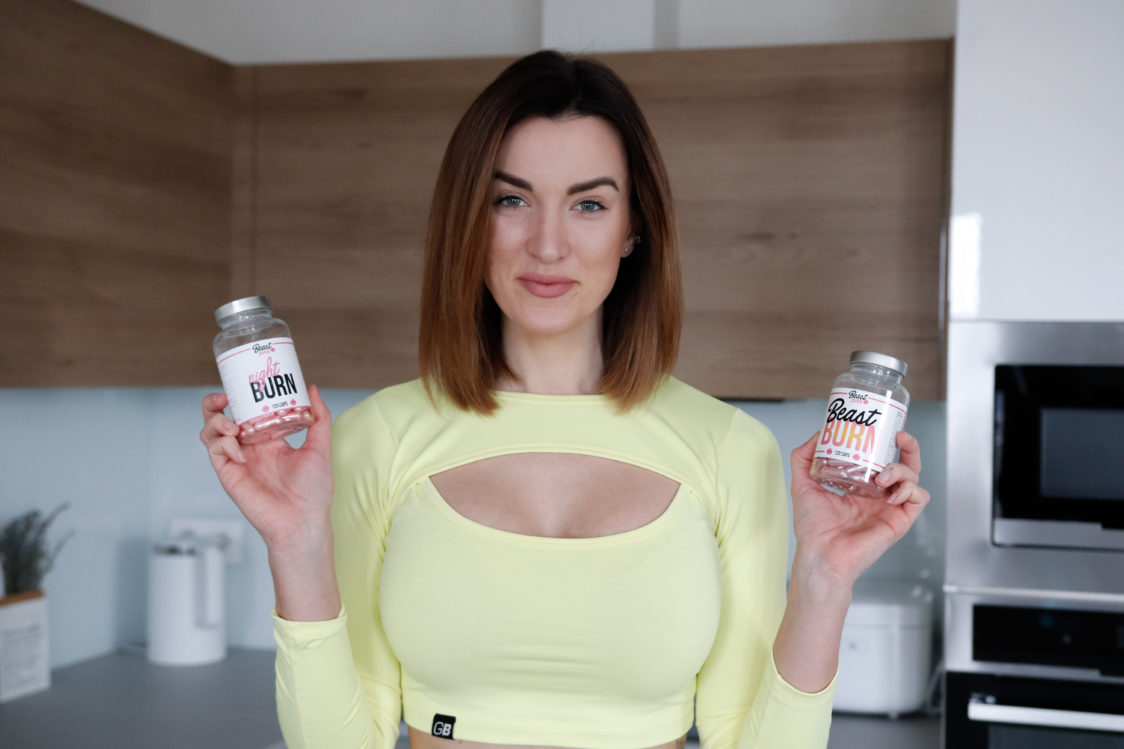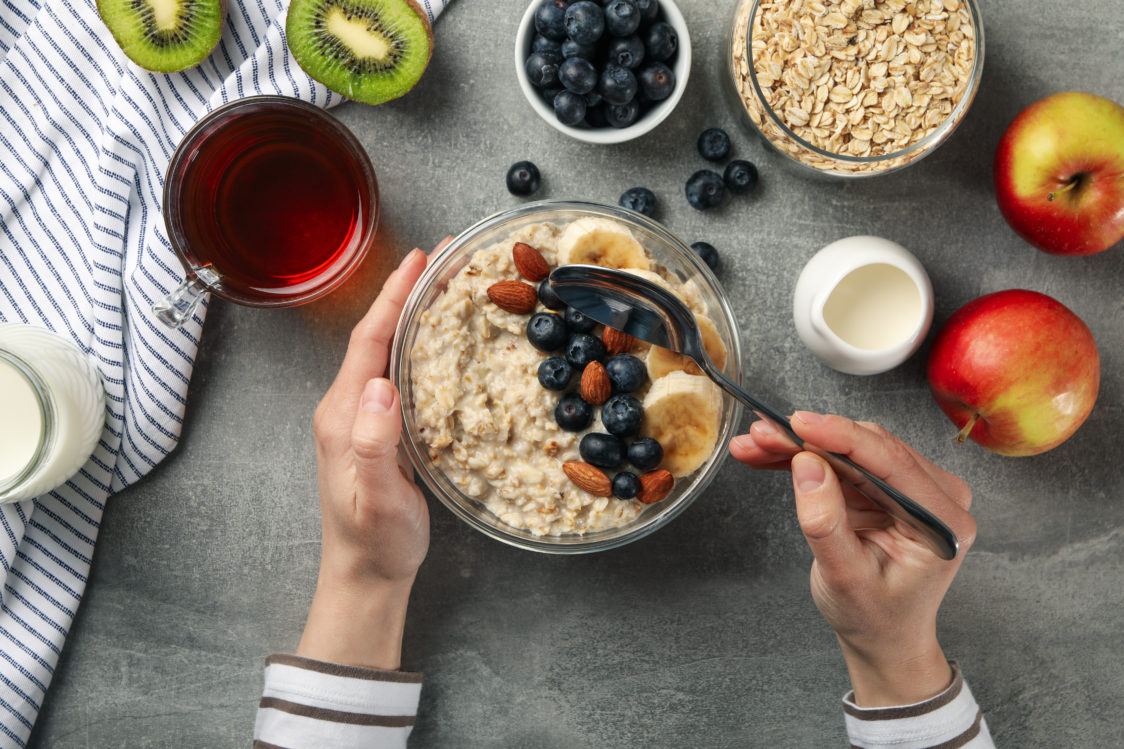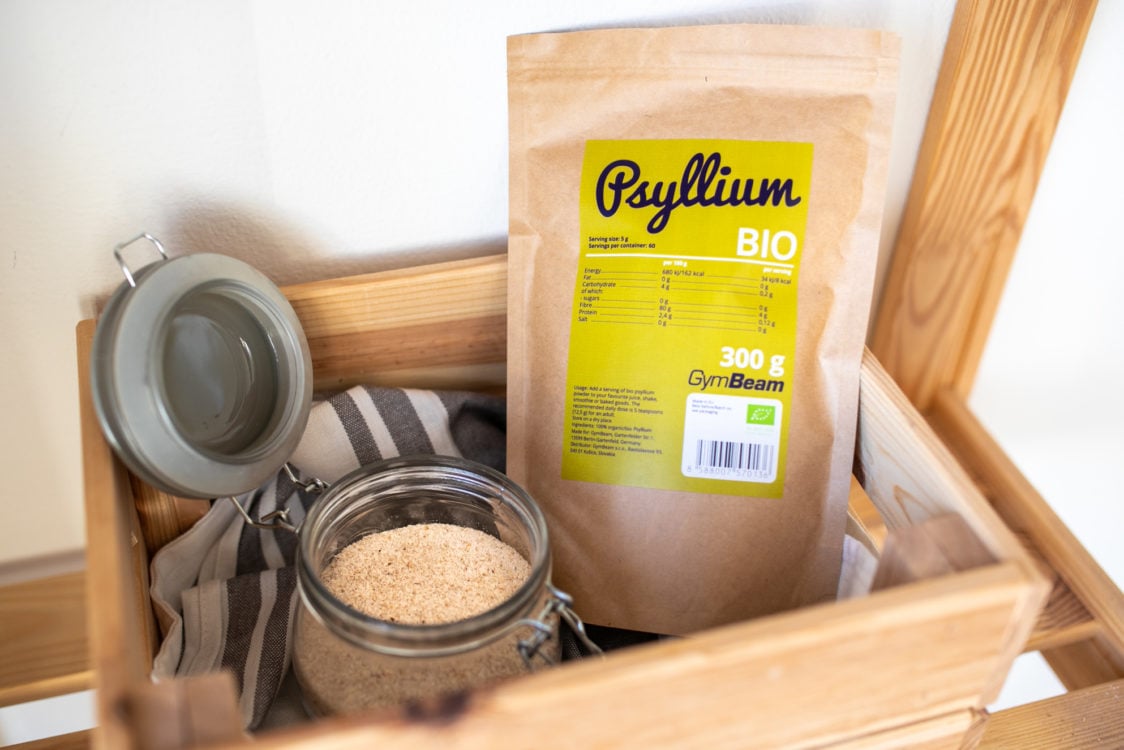Table of Contents
Perhaps everyone who has ever tried to lose weight has wished in the back of their mind that they had some magic pill that could magically make all the excess fat disappear. Unfortunately, nothing like that exists. The good news, however, is that there are substances that can make weight loss a little easier and faster. They can, for example, stimulate the burning of fats or support the feeling of satiety, thus preventing hunger or sweet cravings. Today’s article will tell you more about these helpers.
Can nutritional supplements help with weight loss?
Have you started the process of losing weight and the first thing you think about is which almighty pill will make it easier for you? Not so fast. Miracles happen only in fairy tales, and no one has yet invented a potion for weight loss. Fortunately, science is already far enough to be able to determine which substances can help you a little and make the whole journey slightly easier.
However, don’t expect them to lose the weight for you. You’ll save yourself a lot of disappointment by simply accepting that you’ll have to do more of the work yourself. In order to succeed, you must first of all set your calorie deficit correctly. You will lose weight only when your energy expenditure is higher than energy intake. Our online calculator can help you solve the mystery of how much energy you should consume while losing weight. The resulting number from the calculator must then be used for building a specific menu and putting together a plan to manage the whole thing without unnecessary trouble.
It is important to follow some form of a regular schedule or to choose foods that fill you up and help prevent hunger and sweet cravings. If you want to know how to put together a healthy diet with an optimal ratio of protein, carbohydrates and fats, read our article What Is a Healthy Diet and How to Learn to Eat Healthy?
Also, don’t forget about things like exercising enough, getting enough of high-quality sleep or stress management.
If all the above mentioned things are in order, it’s time to think about which substances can make your weight loss a little easier. Forget about tea that supposedly dissolves your belly fat, herbs that boost your metabolism, or detox that flushes out toxins from your body along with fat on your thighs. You should run as far as possible from these. Not only will you avoid disappointment, but you will also help your wallet.
However, there are some supplements whose effect has already been researched and they really can help, for example, with accelerating metabolism, supporting fat burning or affecting the feeling of satiety. However, they really work only as their name says, as a supplement.

How do weight loss supplements work?
Substances that can help you lose weight have several different mechanisms of achieving that.
Types of weight loss supplements:
- Some of them help promote fat burning through various processes, resulting in faster weight loss. In simple terms, these substances can speed up fat metabolism. [7]
- In some substances, the thermogenic effect plays an important role. The higher their thermogenic effect, the more they support heat production in the body, which costs the body more energy. The energy consumed in this way in the form of heat is excreted from the body instead of being stored in the form of fat. These substances thus help to increase the total energy expenditure. [7]
- The so-called pre-workout stimulants can encourage the body to perform at a higher level. After a “kick” with such a nutritional supplement, you are able to perform better in sports, increase the intensity of training, and ultimately burn more calories. [7]
- Food supplements that affect appetite and the feeling of hunger and satiety are also very effective. Some of them can help you to fill up more thanks to the fact that they effectively satiate your stomach. Others influence the secretion of hormones, which have the task of sending information about feelings of hunger and satiety to the brain.
- Some substances also limit the absorption of nutrients (so-called fat or carb blockers) from the digestive tract into the blood and thus reduce the total energy intake. This is exactly how the well-known over-the-counter drug Orlistat works. It limits the digestion of fat from food.

What are the best supplements for weight loss?
As mentioned above, supplements can work for you in different ways. It is therefore advisable to think about which of them suits you personally with their effects and can best help you achieve your goal. At the same time, It’d be advisable to choose among those that have already received considerable attention from scientists and whose effects are supported by studies. What weight loss supplements can you choose from?
Fat burners: nutritional supplements with an impact on metabolism
The good news is that there really are substances that can boost your metabolism and make it perform better. They are commonly known as fat burners. They include all those that promote fat burning or increase energy expenditure thanks to their thermogenic effect. However, it is still important to take them only as something extra to give you a little boost. The basis of weight loss should always be a good diet and regular exercise.
In the Fat Burners Section, you can read about the following substances:
1. Caffeine
This stimulant, which we all imagine mostly in the form of coffee beans, is a daily part of the lives of many of us. Its stimulating effects are very well known and used regularly when you need to start a difficult day or just improve your mood. In addition to coffee, you can also use other sources of caffeine, for example guarana or matcha tea. At the same time, caffeine can be synthetically produced, and that is the type usually found in nutritional supplements. [12]

What are the effects of caffeine?
Caffeine has several effects.
- It is an effective stimulant that can support sports performance — not only endurance, but also strength. And better performance goes hand in hand with a higher energy expenditure. [6]
- Caffeine supports fat burning. Its intake increases the level of adrenaline and noradrenaline, which increase the release of fatty acids from fat stores and their use as a source of energy. [7, 12]
- When consuming caffeine, its thermogenic effect increases heat production, and thus also energy expenditure.
- Caffeine binds to adenosine receptors instead of adenosine, thereby preventing the induction of fatigue and sleepiness. Thanks to this effect, you feel more awake and full of energy. Not only are you able to perform better in sports, but you can also be more active during the day (more energy to run up the stairs instead of using the elevator, etc.). [12]
The article Caffeine Before a Workout: Functions, Benefits, Risks and Dosage can give you more information about the effects of caffeine.
Where is caffeine found?
When thinking about caffeine, most people probably imagine the delicious smell of coffee beans. However, caffeine has some other sources.
Other sources of caffeine:
- Green or black tea
- Cocoa beans
- Guarana
- Matcha
- Yerba maté
It is found in different amounts in each of the sources. However, if you want to use caffeine for its effects on fat metabolism, it is best to take it as a nutritional supplement in the form of a powder or tablets. In this way, a single serving can give you the exact amount needed to support fat burning. [6]
How to take caffeine?
The European Food Safety Authority (EFSA) says that the daily intake of caffeine for a healthy adult weighing 70 kg should not exceed 400 mg. This is the daily intake of caffeine that is considered safe. What does this amount of caffeine look like? A small espresso, for example, contains approximately 70-100 mg of caffeine, while one teaspoon of instant coffee contains approximately 60 mg of caffeine. [4, 28]
International Society of Sports Nutrition (ISSN) recommends a dose of 3-6 mg/kg taken 30–90 minutes before training to support sports performance. For a 70 kg person, this represents 210-420 mg of caffeine. [6]
If you want to support fat burning with caffeine, a single serving should contain 200 mg of caffeine. Caffeine tablets usually contain such an amount.
What to combine caffeine with?
Caffeine works well with synephrine, EGCG or alternatively forskolin. People who experience the sudden onset of energy too intensely can try combining it with amino acid L-theanine, which is commonly found, for example, in green tea. For beginners, it is advisable to stick to a lower intake.
You might be interested in these products:
2. Green Tea Extract
You might have noticed that not only after coffee, but also after green tea, you feel energized, warm or even sweaty. There are several substances in green tea that are behind these effects. These are not just the already mentioned caffeine or L-Theanine, but the so-called catechins also play an important role in it. Their amount depends on the rate of fermentation. The less fermented the tea, the more catechins it contains. Therefore, compared to, for example, white or black tea, green tea contains the largest amount of them. The most important of the catechins is epigallocatechin-3-gallate, known as EGCG. You can find food supplements like this green tea extract, which contain both caffeine and EGCG. [7, 12]
What are the effects of EGCG?
- EGCG acts in the digestive tract, where it seemingly reduces the function of enzymes that have the task of digesting fat and carbohydrates. Nutrients that are not broken down in the intestine cannot be absorbed into the blood and converted into energy. This reduces the total energy intake from food. [20]
- EGCG also supports metabolism and fat burning. It seems that it helps to maintain a higher level of hormones involved in the breakdown of fat (adrenaline and noradrenaline). [7]
- This substance also acts as an effective antioxidant. It helps the body fight free radicals, which can decrease the risk of various diseases (e.g. cancer). EGCG has up to 25 to 100 times higher antioxidant activity than vitamin C or E.
How to take EGCG?
In order to observe its effects, it is recommended to take 400-500 mg of EGCG daily. Lower doses may not be sufficient. However, to achieve such a quantity, it is usually necessary to take it in the form of a dietary supplement. Since the EGCG content in one cup of green tea is around 50-110 mg, you would need to drink 4-8 cups of tea per day to reach the recommended dose. [28]
What to combine EGCG with?
The combination of EGCG with caffeine seems to work really well. The final effect on metabolism increases with their joint use. However, if you have a built-up tolerance to caffeine, this combination may not work. If that’s the case for you, try limiting the consumption of caffeine for some time.

3. Synephrine
If you’ve ever read the labels of some fat burners, you’ve probably come across the word synephrine. It is a substance that is naturally found in bitter oranges. The effects on the metabolism are described especially for the form called p-synephrine, which is usually present in nutritional supplements. [20, 28]
What are the effects of synephrine?
- This substance affects the metabolism of fat and promotes its burning and use as a source of energy by muscle cells. [15, 28]
- Synephrine also seems to increase resting metabolism and energy expenditure, thanks to its thermogenic action. [15]
- In addition, it also seems to affect the parts of the brain that influence food intake . It can thus help to suppress the appetite. [17]
How to take synephrine?
In order for the use of synephrine to be effective, it is recommended to take 20 mg before physical activity. It is advisable to start with lower doses, especially if it is used together with other substances (for example caffeine or EGCG). [28]
What to combine synephrine with?
The effects of synephrine are mostly investigated in combination with other substances. Therefore, it’s a good idea to not take it by itself, but, for example, together with caffeine and the already mentioned EGCG.

4. L-Carnitine
L-Carnitine is a substance that the body produces from the amino acids lysine and methionine. Up to 98% of carnitine stores are found in skeletal and cardiac muscle, while the rest is hidden in the liver and kidneys. The body can produce it, but we also get it from animal foods. That is why vegans, who lack these foods in their diet, could benefit from its supplementation. [7]
What are the effects of L-Carnitine?
Its main role is the transfer of fatty acids through the mitochondrial membrane. Think of mitochondria as small power plants in which all the energy processes of cells take place. In order for fatty acids to be converted into energy and burned, they must enter the mitochondria. L-Carnitine acts as a ferryman in charge of their transfer. The assumption is that if someone has lower levels of L-Carnitine, supplementing it can cause fat to move into the mitochondria faster and thus be burned faster. [7]
Where is L-Carnitine found?
The main source of carnitine is animal foods like meat, fish, eggs or dairy products. People who do not have these foods in their diet, especially vegans, can derive its effects from nutritional supplements.
How to take L-Carnitine?
L-Carnitine is normally supplemented in a dose of 500-2000 mg per day. [31]
What to combine L-Carnitine with?
There are no specific combinations for L-Carnitine. It can be used with any other substance.

5. CLA
Conjugated linoleic acid, also known as CLA, is a fatty acid that is naturally formed in the digestive tract of ruminants. Therefore, its main sources are the meat of these animals and dairy products. However, it can also be produced synthetically, which is the form present in nutritional supplements.
What are the effects of CLA?
- It affects the metabolism of fat in such a way that it seems to support its splitting to a certain extent and reduces the formation of stored fat. [24, 26]
- It seems that it could even have an effect on suppressing the transformation of mature fat cells (pre-adipocytes) into adult adipocytes. [26]
- CLA is also attributed with the ability to reduce appetite. [11]
How to take CLA?
In order to achieve the desired effects of CLA, it is recommended to take 3.2-6.4 mg daily. [25]
What to combine CLA with?
Similarly to L-Carnitine, CLA can be used in combination with various other substances to support weight loss.

6. Forskolin
Forskolin is a substance produced by the exotic Indian nettle. You can also find it under the name Coleus forskohlii and it may be familiar to those of you who are interested in Ayurvedic medicine. [14]
What are the effects of forskolin?
- Forskolin is known for its effect on increasing cAMP (cyclic adenosine monophosphate) levels. This compound is important in many biochemical processes in the cell, including fat metabolism. By increasing its level you can support the function of the so-called hormone-sensitive lipase (hormone that helps release fat from fat cells). [7, 18]
- There is also talk about the influence of forskolin on proteosynthesis, i.e. the creation of proteins. However, its effects are not yet well researched, so it’s more beneficial to use it to lose weight and not to gain muscle mass. [28]
How to take forskolin?
Nutritional supplements that you can find on the market contain an extract from the root of the Indian nettle. In order for the use of forskolin to be effective, it is recommended to take 250 mg of the extract twice a day. The extract should contain 10% forskolin. [8]
What to combine forskolin with?
Forskolin is used, for example, in combination with caffeine, EGCG or synephrine, as it can support their fat burning effect.
7. What other substances can have an effect on burning fat?
In addition to the substances mentioned above, there are many others that show promising effects. However, they are not sufficiently explored yet. What are they and what effect could they have?
- Green coffee – Unroasted coffee contains a concentrated amount of chlorogenic acid, which might have an effect on reducing the absorption of carbohydrates. However, do not confuse it with, for example, the product called Black Latte, which has coffee only in the name, but not in the composition. [29]
- Garcinia cambogia – This small fruit contains the so-called hydroxycitric acid, which could play a role in suppressing the formation of stored fat. However, its effects are still poorly researched. [9]
- Capsaicin – A substance derived from chili peppers not only burns the taste buds on your tongue, but it appears that it may also increase energy expenditure. [23]

How to navigate fat burners on the market?
When choosing the right fat burner, you might end up going crazy from all the options. There are so many products on the market, and at first glance it is not easy to familiarize yourself with them.
First, let’s divide them into two basic groups:
- Complex fat burners are made up of a mixture of substances with an effect on metabolism and weight loss support. These supplements contain substances that are known to complement each other thanks to the so-called synergistic effect. This means that by combining them, the final effect on metabolism is higher than the effect of these substances alone. An example of such a product is FueBurn, which combines ECGC with caffeine, forskolin, synephrine and other substances.
- Single-type fat burners always contain only one substance, so caffeine, green tea extract, L-Carnitine, etc. are sold separately. It is possible to use only one of them or to combine them. You can create your own burner and thus increase the overall effect of individual substances.
What are the recommended amounts of fat burners?
| Caffeine | A single serving of 200 mg, the maximum daily serving is 400 mg |
| Green Tea Extract | 400 – 500 mg |
| Synephrine | 20 mg |
| CLA | 3.2 – 6.4 mg per day |
| L-Carnitine | 500 – 2000 mg per day |
| Forskolin | 250 mg of extract twice a day |
How to build an effective fat burner?
The combinations of substances in individual products on the market are different. An effective combination could look like this:
- 200 mg Caffeine
- 20 mg Synephrine
- 400 mg EGCG
- 100 mg Forskolin
- 1000 mg L-Carnitine
- 1000 mg Garcinia
In the beginning, it is recommended to add individual substances gradually. For example, if you are not used to regular caffeine consumption, it is possible that it will be enough for you to take it on its own. However, you can gradually add other active substances. Always start with lower doses and use the burners before physical activity. [28]
Nutritional supplements with an effect on satiety
Since the basic condition for losing weight is a calorie deficit and a reduced intake of energy from the diet, ingredients that ensure a feeling of satiety and help with avoiding hunger are greatly appreciated. Which of them can also be found in the form of a nutritional supplement?
In this section, you can read about the following substances:
1. Protein
Protein (also called proteins) is so popular mainly due to its ability to satiate. It has the highest satiating capacity of all three macronutrients (protein, carbs, fats). Therefore, it is important that every diet designed for weight loss contains a sufficient amount of it.
What are the effects of protein?
- Protein ensures satiety by promoting the release of hormones (glucagon-like peptide 1, cholecystokinin), which have the task of telling the brain that you are full. [21]
- At the same time, it has the highest thermic effect of all nutrients. In translation, this means that you burn the largest amount of energy when digesting them. The body burns up to 20-30% of the total energy intake from protein during its digestion. For example, if you take 100 kcal in the form of protein, the body burns 20-30 kcal during its digestion.
How much protein to take per day?
A healthy adult, who doesn’t lead a very active life, is recommended to take 0.8-1 g of protein/kg of body weight per day, while higher values are more advantageous. For a woman weighing 60 kg, this represents 48-60 g of protein. However, if this woman would like to lose weight, this amount will certainly not be enough for her. She’d need to increase her protein intake to make sure she doesn’t lose muscle mass during her weight loss. The recommended intake of protein in a weight loss diet is 1.6-2.4 g/kg, especially if you also engage in strength training. [32]

Where is protein found?
The best sources of protein are animal foods such as meat, fish, dairy products and eggs. These resources will provide you with the so-called complete protein that contains all essential amino acids (those that the body cannot create and must receive in food).
Plant foods don’t have essential amino acids in optimal amounts, but they can still be a high-quality source of protein. Legumes, especially soy and chickpeas, hold the top ranks in terms of plant protein quality. Amaranth or quinoa also have a good composition.
What about protein powders?
Protein supplementation in the form of protein powder definitely has its place in the diet. You can use them to quickly replenish protein after training or to enrich your food with a high-quality source of protein. They also come in handy when you need to efficiently meet the recommended daily protein intake and a diverse diet is not enough for you.
The first and best option for how to supplement protein is whey protein. It seems to have an even higher satiating capacity than other protein sources. However, if you prefer a plant-based diet, there are options for you too. You can try, for example, soy, hemp or other plant-based proteins.[13]

Fibre
Fibre is a polysaccharide that our digestive enzymes cannot deal with and therefore passes through the digestive tract in an unchanged form. This helpful nutrient has countless benefits, from the support of digestion, the influence on the gut microbiota, to the prevention of cancerous diseases of the digestive tract. No less important, however, are its effects on promoting satiety and keeping the blood sugar level in check.
What are the effects of fibre?
There are several different types of fibre. A basic division divides the types of fibre between insoluble and soluble. Soluble fibre is the one that has the greatest impact on satiety and food intake.
- Soluble fibre takes on a gel consistency in the intestine. This gel slows down digestion, which helps to keep you full for a longer time. [3]
- At the same time, it slows down the absorption of glucose from the intestine into the blood, thereby preventing fluctuations in blood sugar (glycemia). This effect is more important than it might seem at first glance. Fluctuations in glycemia are associated with an increased appetite for sweets. Soluble fibre can alleviate this discomfort and thus prevent unwanted trips to a candy shop.
You can find out more about the effects of both soluble and insoluble fibre in the article Dietary Fibre: Why Is It Important and What Are Its Sources?

How much fibre to take per day?
There are several recommendations for fibre intake, but most agree that the daily intake of fibre should be at least 25 g. [5, 27]
Where is fibre found?
Fibre is found naturally only in food of plant origin. Its sources are legumes, whole grains, vegetables, fruits, nuts and seeds.
Fibre as a dietary supplement
If you cannot get enough fibre from your diet, you have the option to choose from many nutritional supplements. They offer various types of fiber in a concentrated form.
- Glucomannan is a fibre usually made from the root of the konjac plant. Compared to other types of fibre, it can increase its volume up to 50 times. You may know it as a raw material used to make pasta with a minimum caloric value. [10]
- Psyllium comes from a plant called Plantago ovata. In addition to the fact that it can serve, for example, to reduce the absorption of sugar into the blood, it is also used as a supplement for bowel problems. [33]
- Chitosan is a polysaccharide that is naturally found in the shells of crabs, mussels, shrimps, etc. It seems to also have an effect on lowering cholesterol and blood sugar levels. [30]
- Guar gum is something you might have come across on the labels of some foods. It is not some dangerous artificial ingredient. It’s a fibre that improves the texture of food and has similar effects to other types of soluble fibre.
- Inulin is a soluble fibre originating from the chicory plant root. You may know it thanks to the popular chicory syrup, which can be used as a substitute for sugar.

How to take fibre?
Adding fibre to your daily diet is quite simple.
- Mix it, for example, into porridge or yogurt.
- Add it as another ingredient to a smoothie.
- You can also dissolve it in a drink, for example in juice or tea, or in clean water.
How to navigate dietary supplements with fibre?
In this case too, there is a countless number of products to choose from.
- You can try nutritional supplements containing one type of fibre, such as glucomannan or psyllium.
- Another option is multi-component products, in which the effects of several types of fibre are combined.

3. Chromium
Chromium is a mineral substance that our body needs for many energy processes, as well as for the proper function of insulin. You’ve probably heard of it as a supplement that could help people with type 2 diabetes control their blood sugar (glycemia) levels.
What are the effects of chromium?
- Chromium is part of the process during which insulin moves sugar from the blood into the cells. Thanks to this, it seems that the supplementation of this mineral substance can help maintain a more stable glycemia. And this can help not only people with diabetes. Even a healthy person might be having to deal with glycemic fluctuations, which are manifested, for example, by constant sweet cravings. [22]
- Improved insulin function is also related to better maintenance or building of muscle mass. [2]
- It is also possible that chromium affects hormones that induce feelings of satiety and reduce appetite. [2]
How to take chromium?
The recommended daily dose of chromium is 40 µg. However, if you want to benefit from the impact of chromium in your diet, it is recommended to take 200 µg per day.
4. White Bean Extract
White bean extract is among the promising nutritional supplements that are referred to as carb blockers. As their name suggests, they partially prevent the breakdown of carbohydrates in the digestive tract. Carbohydrates that are not broken down cannot be subsequently absorbed into the blood. Instead, they pass unchanged into the large intestine. There they are partially digested by intestinal bacteria, or they are excreted from the body. Thanks to this effect, the extract can help reduce total energy intake. [34]
What should you watch out for when using nutritional supplements?
The use of nutritional supplements should be well thought out and planned thoroughly. As with everything, if you overdo it with them, unpleasant side effects can occur.
- When using fat burners with a stimulating effect, especially a large amount of caffeine, there is a risk of an increase in blood pressure and heart rate. Therefore, people who have high blood pressure or are more sensitive to caffeine should control their intake.
- Excessive intake of caffeine can be manifested by rapid heartbeat or headache.
- It’s not unusual for supplements that are meant to give you a boost to also disrupt your sleep pattern. Therefore, it’s advisable to limit their intake in the late afternoon, or to reach for supplements that do not contain stimulants.
- Even such an innocently looking nutrient as fibre can have adverse effects. If you take excessive amounts (over 50 g) of it for a long time, it can cause constipation, abdominal pain or reduce the absorption of important nutrients (vitamins, minerals, etc.) from the digestive tract.
Therefore, don’t experiment with food supplements too much. Stick to the recommended dosage on the product label.

What should you remember?
Are you trying to lose weight and would you like to try a nutritional supplement to help you with it? If you got intrigued by an ad for some miracle cure that promises instant results and weight loss with the snap of a finger, forget it. Teas, detox treatments or herbal elixirs will not help you. However, after reading today’s article, you already know that there are substances that can support weight loss to a certain degree. However, whether you choose supplements that speed up fat burning or those that affect your appetite, don’t count on them losing the weight for you. The cornerstone of success is always a correctly set calorie deficit, healthy eating habits and physical activity.
[1] BARBER, T.M. et al. The Health Benefits of Dietary Fibre. – https://www.ncbi.nlm.nih.gov/pmc/articles/PMC7589116/
[2] BONETTI, G. et al. Dietary supplements for obesity. – https://www.ncbi.nlm.nih.gov/pmc/articles/PMC9710396/
[3] DUYFF, R.L. Complete Food & Nutrition Guide. New York: Academy of Nutrition and Dietetics, 2017. ISBN 978-0-544-52058-5.
[4] EFSA Scientific Opinion on the safety of caffeine. – https://www.efsa.europa.eu/en/efsajournal/pub/4102
[5] EFSA PANEL ON DIETETIC PRODUCTS, NUTRITION, AND ALLERGIES (NDA) Scientific Opinion on Dietary Reference Values for carbohydrates and dietary fibre. – https://onlinelibrary.wiley.com/doi/abs/10.2903/j.efsa.2010.1462
[6] GUEST, N.S. et al. International society of sports nutrition position stand: caffeine and exercise performance. – https://pubmed.ncbi.nlm.nih.gov/33388079/
[7] JEUKENDRUP, A.E. - RANDELL, R. Fat burners: nutrition supplements that increase fat metabolism. – https://onlinelibrary.wiley.com/doi/full/10.1111/j.1467-789X.2011.00908.x
[8] KAMAL PATEL, M.P.H. Coleus Forskohlii Research Analysis. – https://examine.com/supplements/coleus-forskohlii/
[9] KAMAL PATEL, M.P.H. Garcinia Research Analysis. – https://examine.com/supplements/garcinia/
[10] KEITHLEY, J. - SWANSON, B. Glucomannan and obesity: a critical review. – https://pubmed.ncbi.nlm.nih.gov/16320857/
[11] KENNEDY, A. et al. Antiobesity Mechanisms of Action of Conjugated Linoleic Acid. – https://www.ncbi.nlm.nih.gov/pmc/articles/PMC2826589/
[12] MIKE MURRAY, R.D.N. Fat Loss Research Analysis. – https://examine.com/categories/fat-loss/
[13] MOLLAHOSSEINI, M. et al. Effect of whey protein supplementation on long and short term appetite: A meta-analysis of randomized controlled trials. – https://pubmed.ncbi.nlm.nih.gov/29072167/
[14] RÍOS-HOYO, A. - GUTIÉRREZ-SALMEÁN, G. New Dietary Supplements for Obesity: What We Currently Know. – https://www.ncbi.nlm.nih.gov/pmc/articles/PMC9710396/
[15] RUIZ-MORENO, C. et al. Effects of p-Synephrine during Exercise: A Brief Narrative Review. – https://www.ncbi.nlm.nih.gov/pmc/articles/PMC7830131/
[16] SÁ, A.G.A. et al. Plant proteins as high-quality nutritional source for human diet. – https://www.sciencedirect.com/science/article/pii/S0924224419308994
[17] STOHS, S.J. et al. p‐Synephrine, ephedrine, p‐octopamine and m‐synephrine: Comparative mechanistic, physiological and pharmacological properties. – https://www.ncbi.nlm.nih.gov/pmc/articles/PMC7496387/
[18] STOHS, S.J. - BADMAEV, V. A Review of Natural Stimulant and Non‐stimulant Thermogenic Agents. – https://www.ncbi.nlm.nih.gov/pmc/articles/PMC5067548/
[19] TABRIZI, R. et al. The effects of caffeine intake on weight loss: a systematic review and dos-response meta-analysis of randomized controlled trials. – https://pubmed.ncbi.nlm.nih.gov/30335479/
[20] WATANABE, M. et al. Current Evidence to Propose Different Food Supplements for Weight Loss: A Comprehensive Review. – https://www.mdpi.com/2072-6643/12/9/2873
[21] WESTERTERP-PLANTENGA, M.S. et al. Dietary protein – its role in satiety, energetics, weight loss and health. – https://www.cambridge.org/core/journals/british-journal-of-nutrition/article/dietary-protein-its-role-in-satiety-energetics-weight-loss-and-health/CCA49F7254E34FF25FD08A78A05DECD7
[22] WILLOUGHBY, D. et al. Body Composition Changes in Weight Loss: Strategies and Supplementation for Maintaining Lean Body Mass, a Brief Review. – https://pubmed.ncbi.nlm.nih.gov/30513859/
[23] ZHENG, J. et al. Dietary capsaicin and its anti-obesity potency: from mechanism to clinical implications. – https://www.ncbi.nlm.nih.gov/pmc/articles/PMC5426284/
[24] A review on effects of conjugated linoleic fatty acid (CLA) upon body composition and energetic metabolism. – https://pubmed.ncbi.nlm.nih.gov/26388708/
[25] Conjugated Linoleic Acid — Health benefits, dosage, safety, side-effects, and more | Supplements – https://examine.com/supplements/conjugated-linoleic-acid/
[26] Dietary conjugated linoleic acid and medium-chain triglycerides for obesity management – https://pubmed.ncbi.nlm.nih.gov/33709964/
[27] Dietary Guidelines for Americans, 2020-2025. – https://www.dietaryguidelines.gov/sites/default/files/2020-12/Dietary_Guidelines_for_Americans_2020-2025.pdf
[28] Fat Loss - Supplement Guides on Examine. – https://examine.com/guides/fat-loss/
[29] Green Coffee Extract — Health benefits, dosage, safety, side-effects, and more | Supplements – https://examine.com/supplements/green-coffee-extract/
[30] Chitosan — Health benefits, dosage, safety, side-effects, and more | Supplements – https://examine.com/supplements/chitosan/
[31] L-Carnitine — Health benefits, dosage, safety, side-effects, and more | Supplements – https://examine.com/supplements/carnitine/
[32] Optimal Protein Intake Guide – https://examine.com/guides/protein-intake
[33] Psyllium — Health benefits, dosage, safety, side-effects, and more | Supplements – https://examine.com/supplements/pallium
[34] White Kidney Bean Extract — Health benefits, dosage, safety, side-effects, and more | Supplements – https://examine.com/supplements/white-kidney-bean-extract/


Add a comment